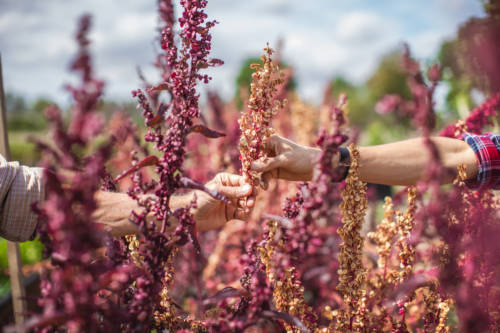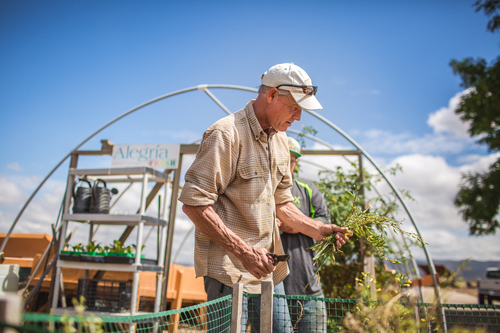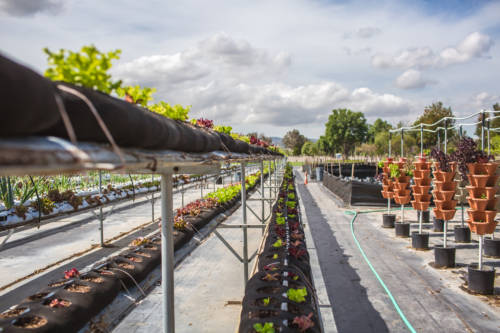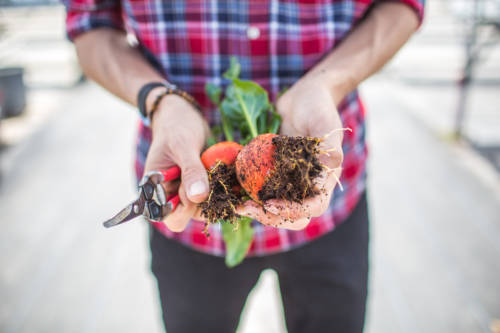
Erik Cutter Is The Soil Savior We’ve All Been Looking For
Even though Erik Cutter’s credentials read biochemist and oncologist, his résumé nods to an ambitious diversity in entrepreneurial endeavors, beginning with funding an automotive design business— which would later be named one of the 500 fastest growing, privately-held companies in the U.S. in 1989.
Following this success, he spent time traveling the world as a photographer and Communication Director teaching developers how to become more sustainable. This is when he wasn’t working on Baja Life, a tourism magazine that showcased the beauties of Baja, California, when it was undergoing a renaissance.
It was through his travels, however, that Erik Cutter, founder of Alegría Farm, would begin to recognize the disparity between the food he encountered in mainstream markets and the nutrient-dense food he knew could be produced locally. The next step in his journey would be creating high-production food systems, healing those who ate his produce, and spending lots of time with soil in between.
Alegría, the Spanish word for joy, has been a positive outlier in an agricultural turn-and-burn farming system that is dutifully eradicating the organic matter— known as humus— that nutrient-dense food desperately needs to thrive. “One of my favorite guys identified the fact that humus and human are spelled the same way, and by the way, they mean the same thing: of and for the earth.
“We can feed people using organic farming methods– better than we ever have before. It just takes time to go backwards and build up the soil…”
What we lack is humility because we are destroying humus and not focusing on building organic matter. Our plants are sick because our soil is sick, and as a result more pesticides get used which kill the critical biology in the soil,” Cutter laments.
“We’ve fed a lot of people using pesticide intensive farming, and there’s a powerful argument that we need this to feed the world, but it’s not true. We can feed people using organic farming methods, better than we ever have before. It just takes time to go backwards and build the soil up,” he insists.
Centralizing food production is not sustainable, but it has bumped America from the number one healthiest country in the world to number 33 (as of November 2015). When Cutter began to deconstruct our food supply, it was obvious to him why inflammatory diseases such as Cancer and Diabetes onset at age 12 are the new norm for many Americans.
“We are no longer in contact with the biological factors– In other words, we’re all about antibiotics and washing our hands when we aught to be bathing in mud. Good mud— not mud [laced] with heavy metals and pesticides,” he explains.
Alegría’s mission since day one has been to feed the soil, as optimum soil translates into more nutritious food, which in turn begets optimum health in humans. Cutter’s team does this by creating hydro-organic systems and employing hydroponic farming with microbes, allowing the biology to optimize the nutritional quality of food. “To me, it’s all about biology,” Cutter explains.
“The more beneficial microbes that I can get into my soil, the better for the plant. Our body doesn’t count calories; it counts nutrients. If you’re eating a nutrient-dense salad, you will eat a lot less of it because it’s fired up with all the nutrients you need.
I haven’t been sick in 25 years and I’m not a genetic specimen– I just practice really good eating habits and swear by fresh, locally grown food and having a positive outlook on life,” he confides.
Speaking of positively-charged energy: the cation exchange in our soil is the chemical process between positively-charged ions— such as Calcium and Magnesium— that combine with negatively-charged ions— such as Sulfur and the Humates. The two interact and form complexes that are an instrumental part of a plant’s growth.
“The only material on the planet that can slow or mitigate climate change is soil; it sequesters carbon in the ground.”
“Without magnesium, plants don’t undergo photosynthesis,” Cutter explains. “If a plant is deficient in magnesium, it’s very pale green because it’s not making enough chlorophyll, and chlorophyll provides energy to the plant,” he shares.
Seeing how human health and plant health all come down to soil health, Cutter began to build his own hybrid soil blends three years ago. He places these blends inside a garden soxx system that allows the soil to breathe just as we do while optimizing oxygen, water storage, nutrient uptake, and supporting a plethora of necessary microbes.
Our body is made up of 80 percent fungus and bacteria, and soil is about the same. Humans share a lot of the same bacteria and fungus as soil, and that’s why soil is increasingly being recognized as necessary for human health.
This year, Cutter will be focusing his energy on a soil-building facility that he hopes will take Alegría to the next level, in addition to zero waste urban farming and educational outreach for those interested in building a regenerative farm.
“The only material on the planet that can slow or mitigate climate change is soil; it sequesters carbon in the ground. When plants take in carbon dioxide and deposit it into the soil, the carbon molecules end up where they’re suppose to be– not in the air where there are far too many.
So, by building healthy soil, you actually sequester carbon. It is estimated that if we create .4 percent more organic matter in our soil around the planet, we would absolutely stop climate change in its tracks,” he tells us. “It doesn’t take a lot of humus to make powerful change, but it takes a lot of humans going in the same direction.”
Join the slow food movement today and learn how to emulate Alegría’s pro-soil concept by visiting their website.





































